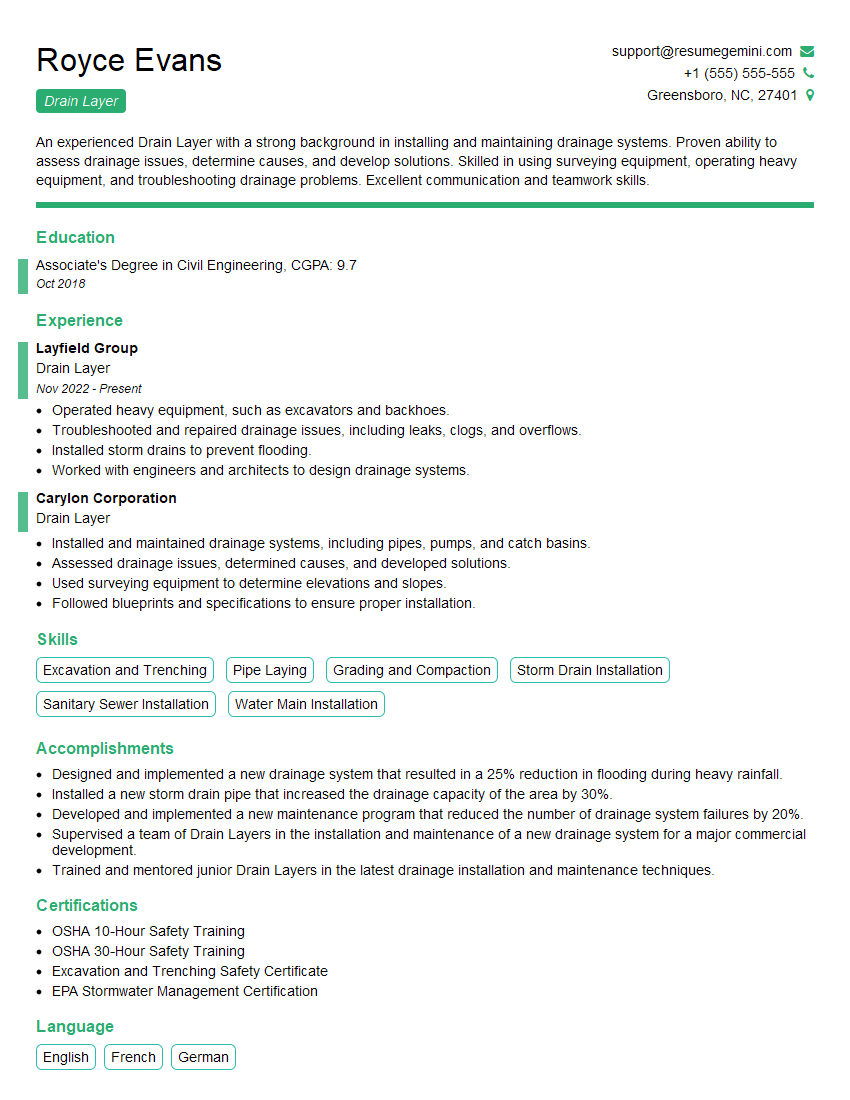Are you a seasoned Drain Layer seeking a new career path? Discover our professionally built Drain Layer Resume Template. This time-saving tool provides a solid foundation for your job search. Simply click “Edit Resume” to customize it with your unique experiences and achievements. Customize fonts and colors to match your personal style and increase your chances of landing your dream job. Explore more Resume Templates for additional options.

Royce Evans
Drain Layer
Summary
An experienced Drain Layer with a strong background in installing and maintaining drainage systems. Proven ability to assess drainage issues, determine causes, and develop solutions. Skilled in using surveying equipment, operating heavy equipment, and troubleshooting drainage problems. Excellent communication and teamwork skills.
Education
Associate’s Degree in Civil Engineering
October 2018
Skills
- Excavation and Trenching
- Pipe Laying
- Grading and Compaction
- Storm Drain Installation
- Sanitary Sewer Installation
- Water Main Installation
Work Experience
Drain Layer
- Operated heavy equipment, such as excavators and backhoes.
- Troubleshooted and repaired drainage issues, including leaks, clogs, and overflows.
- Installed storm drains to prevent flooding.
- Worked with engineers and architects to design drainage systems.
Drain Layer
- Installed and maintained drainage systems, including pipes, pumps, and catch basins.
- Assessed drainage issues, determined causes, and developed solutions.
- Used surveying equipment to determine elevations and slopes.
- Followed blueprints and specifications to ensure proper installation.
Accomplishments
- Designed and implemented a new drainage system that resulted in a 25% reduction in flooding during heavy rainfall.
- Installed a new storm drain pipe that increased the drainage capacity of the area by 30%.
- Developed and implemented a new maintenance program that reduced the number of drainage system failures by 20%.
- Supervised a team of Drain Layers in the installation and maintenance of a new drainage system for a major commercial development.
- Trained and mentored junior Drain Layers in the latest drainage installation and maintenance techniques.
Certificates
- OSHA 10-Hour Safety Training
- OSHA 30-Hour Safety Training
- Excavation and Trenching Safety Certificate
- EPA Stormwater Management Certification
Languages
- English
- French
- German
Career Expert Tips:
- Select the ideal resume template to showcase your professional experience effectively.
- Master the art of resume writing to highlight your unique qualifications and achievements.
- Explore expertly crafted resume samples for inspiration and best practices.
- Build your best resume for free this new year with ResumeGemini. Enjoy exclusive discounts on ATS optimized resume templates.
How To Write Resume For Drain Layer
- Highlight your experience and skills in drainage system installation and maintenance, including any specialized techniques or certifications.
- Quantify your accomplishments whenever possible, using specific metrics to demonstrate the impact of your work.
- Showcase your knowledge of drainage system design and industry best practices, as well as your ability to troubleshoot and resolve drainage issues.
- Emphasize your proficiency in using surveying equipment and heavy machinery, highlighting your precision and attention to detail.
Essential Experience Highlights for a Strong Drain Layer Resume
- Installed and maintained drainage systems, including pipes, pumps, and catch basins, ensuring proper drainage and preventing flooding.
- Assessed drainage issues, determined causes, and developed effective solutions to address specific drainage problems.
- Utilized surveying equipment to accurately determine elevations and slopes, ensuring proper installation of drainage systems.
- Followed blueprints and specifications precisely to ensure compliance with design plans and industry standards.
- Operated heavy equipment, such as excavators and backhoes, for trenching, pipe laying, and other excavation tasks.
- Troubleshooted and repaired drainage issues, including leaks, clogs, and overflows, restoring proper drainage and preventing further damage.
- Installed storm drains to manage stormwater runoff and prevent flooding, ensuring the safety and integrity of infrastructure.
Frequently Asked Questions (FAQ’s) For Drain Layer
What are the primary duties of a Drain Layer?
The primary duties of a Drain Layer involve installing, maintaining, and repairing drainage systems, including pipes, pumps, catch basins, and storm drains. They assess drainage issues, determine causes, and develop solutions to ensure proper drainage and prevent flooding.
What skills are essential for Drain Layers?
Essential skills for Drain Layers include proficiency in excavation and trenching, pipe laying, grading and compaction, storm drain installation, sanitary sewer installation, and water main installation. They should also have a strong understanding of drainage system design and industry best practices.
What industries employ Drain Layers?
Drain Layers are employed in various industries, including construction, landscaping, and municipal services. They work on both residential and commercial projects, ensuring proper drainage and preventing water damage.
What is the career outlook for Drain Layers?
The career outlook for Drain Layers is expected to be positive due to the increasing demand for skilled tradespeople in the construction industry. As infrastructure ages and the need for drainage system maintenance and repair grows, Drain Layers will continue to be in high demand.
What is the average salary range for Drain Layers?
The average salary range for Drain Layers varies depending on experience, location, and industry. According to the U.S. Bureau of Labor Statistics, the median annual wage for Pipefitters, Steamfitters, and Sprinkler Fitters, which includes Drain Layers, was $56,330 in May 2021.
What are the educational requirements to become a Drain Layer?
While formal education is not always required, many Drain Layers have an Associate’s Degree in Civil Engineering or a related field. They may also complete apprenticeships or on-the-job training programs to gain the necessary skills and knowledge.